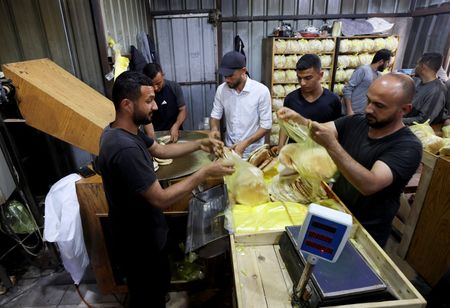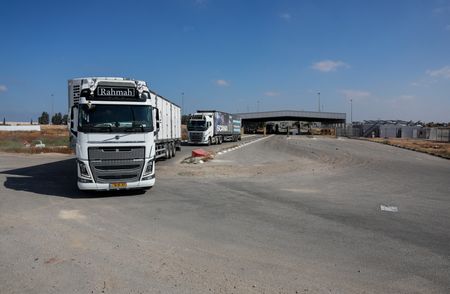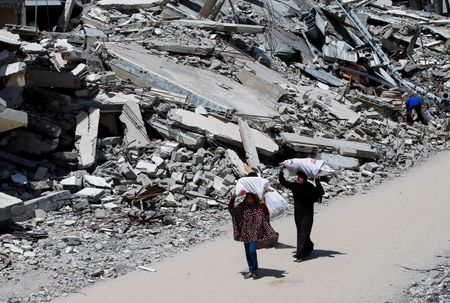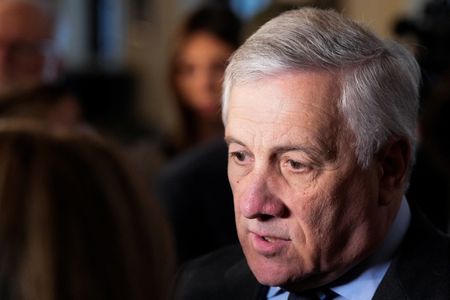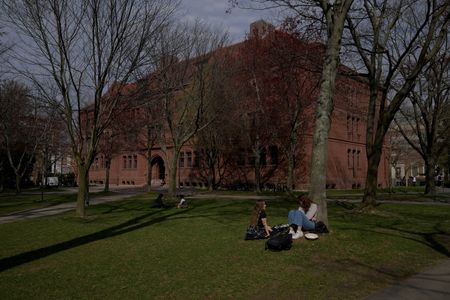By Nidal al-Mughrabi
CAIRO (Reuters) -Flour and other aid started reaching some of Gaza’s most vulnerable areas on Thursday after Israel let some trucks through, but nowhere near enough to make up for shortages caused by an 11-week blockade, Palestinian officials said.
Many other trucks were still at the border, and people were still waiting to receive food, amid fears that desperate crowds would try to loot the vehicles when they arrived, the Palestinian Red Crescent warned.
Israel said it allowed 100 trucks carrying baby food and medical equipment into the enclave on Wednesday, two days after announcing its first relaxation of the restrictions under mounting international pressure.
“Flour arrived from the (U.N.) World Food Programme, and we immediately started working,” baker Ahmed Al-Banna said as flatbreads passed by on a conveyor belt behind him at his base in Deir al-Balah on Thursday.
Bakeries across the south of the enclave started ovens that had been shut for two months, he added. “God willing, bakeries in northern Gaza will soon resume work.”
Israeli Prime Minister Benjamin Netanyahu said late on Thursday that the construction of a “distribution zone” would be completed in the coming days with U.S. companies distributing food in areas controlled by the Israeli military.
“Ultimately, we intend to have large safe zones in the south of Gaza. The Palestinian population will move there for their own safety, while we conduct combat in other zones, and receive humanitarian aid there without Hamas interference,” he said in a video statement released by his office.
Israel imposed the blockade on all supplies in March, saying Hamas was seizing deliveries for its fighters – a charge the group denies. The UN has said a quarter of Gaza’s 2.3 million people are at risk of famine.
The Palestinian health minister said 29 children and elderly people had died from starvation-related reasons in Gaza in recent days and many thousands more were at risk.
Israel has repeatedly defended its controls on aid in Gaza, saying reports from aid groups of famine-like conditions were exaggerated and denying accusations of causing starvation.
Bread distribution would start later on Thursday, Amjad al-Shawa, director of the Palestinian Non-Governmental Organizations Network in Gaza, told Reuters.
He said just 90 trucks had got through. “During the ceasefire, 600 trucks used to enter every day, which means that the current quantity is a drop in the ocean, nothing,” he said.
Bakeries backed by the WFP would produce the bread and the agency’s staff would hand it out – a more controlled system than previously when bakers sold it directly to the public at a low cost, he added.
Palestinian Red Crescent President Younis Al-Khatib said many trucks were still at the border at Karem Shalom and there was a risk of violence and looting when they arrived.
“No civilian has received anything yet,” he said. “It’s very hard to hide the rush or the looting that will happen.”
On Wednesday night, boys and young men gathered after one vehicle arrived in the southern Gazan city of Khan Younis, but kept back as men, some holding guns, watched over the unloading of sacks.
The International Committee of the Red Cross said it had got one truck of medical supplies through to replenish its field hospital in Rafah, but more was needed.
“A trickle of trucks is woefully inadequate. Only the rapid, unimpeded, and sustained flow of aid can begin to address the full scope of needs on the ground,” the organisation said in a statement.
ATTACKS REPORTED
Israel has stepped up its military operation in Gaza since early May, saying it is seeking to eliminate Hamas’ military and governing capabilities and bring back remaining hostages seized in October 2023.
Pressure inside Israel for tougher action is likely to increase after two Israeli embassy staffers were killed by a gunman in Washington on Wednesday night, and police said the suspect had chanted pro-Palestine slogans.
On Thursday, Israeli military strikes killed at least 50 Palestinians across Gaza, local health authorities said.
There was no immediate comment from the Israeli military on the reports. It has repeatedly said it seeks to avoid civilian casualties and targets militants.
In Beit Lahiya on the northern edge of the enclave, a tank shell hit a medicine warehouse inside Al-Awda Hospital and set it ablaze, the health ministry said. Rescue workers had been trying to extinguish the fires for hours, it added.
Tanks are stationed outside the hospital, medics say, effectively blocking access to the facility.
The Gaza healthcare system has been barely functioning, with most of the medical facilities out of order, because of repeated Israeli military strikes, raids and the ban on the entry of medical supplies.
Netanyahu said on Wednesday that Israel would be open to a temporary ceasefire to enable the return of hostages taken by Hamas-led fighters. But if they were not returned, he said it would press ahead with a military campaign to gain total control of Gaza.
“Netanyahu continues to stall and insist on pursuing the war. There is no value to any agreement that doesn’t stop the massacres in Gaza permanently,” senior Hamas official Sami Ab Zuhri said in response to Netanyahu’s comments.
Israel launched its campaign in Gaza in response to the Hamas attack on October 7, 2023, which killed some 1,200 people by Israeli tallies and saw 251 hostages abducted into Gaza.
The campaign has since killed more than 53,600 Palestinians, according to Gaza health authorities, and devastated the coastal strip, where aid groups say signs of severe malnutrition are widespread.
(Reporting and writing by Nidal al-Mughrabi. Additional reporting by Alexander Cornwell, Ramadan Abed in Gaza and Emma Farge in Geneva; Editing by Andrew Heavens and Daniel Wallis)

